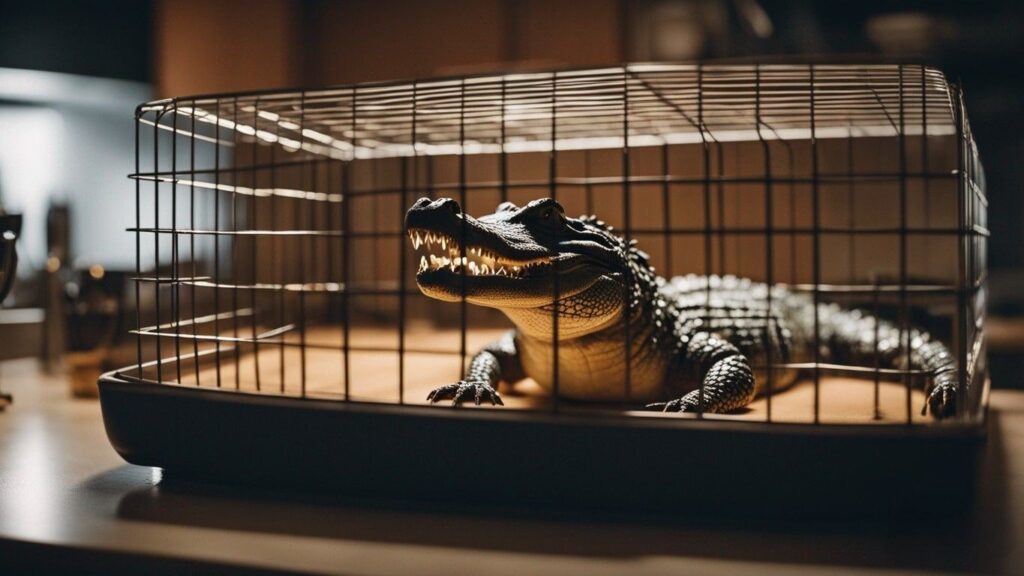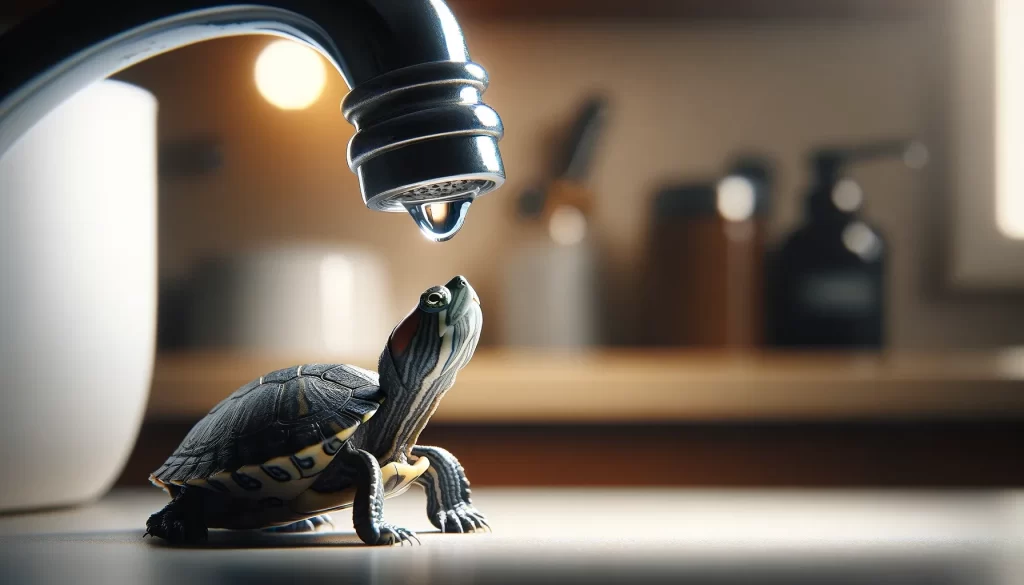
One question that often arises is whether turtles can live in tap water. Well, the answer is not as straightforward as you might think.
While turtles are remarkable creatures, they are also sensitive beings that require specific conditions to thrive.
Turtles should not live in tap water directly as tap water contains chlorine and fluoride, which can be harmful to their health. It is recommended to use de-chlorinated water for the swimming area and filtered water for drinking to ensure the safety of turtles.
Tap water should not be directly used in your turtle’s tank. Tap water contains chlorine and fluoride, which can be harmful to your turtle’s health.
Instead, opt for de-chlorinated water for the swimming area and filtered water for drinking to ensure your turtle’s safety.
Adding a teaspoon of salt per gallon of water can also help protect your turtle from shell and skin diseases.
Remember, maintaining the right water temperature and offering a balanced diet are equally important aspects of turtle care.
Key Takeaways:
- Tap water should not be used directly in a turtle’s tank due to chlorine and fluoride.
- De-chlorinated water is recommended for the swimming area, while filtered water should be provided for drinking.
- A teaspoon of salt per gallon of water can help protect turtles from shell and skin diseases.
- Maintaining proper water temperature and providing a balanced diet are crucial for a turtle’s well-being.
- Turtles require a tank with a dry area for basking under a heat lamp.
Choosing the Right Water for Your Turtle Tank
When setting up a turtle tank, it’s crucial to choose the right water to ensure the health and well-being of your turtle.
While tap water can be used, it needs to be conditioned to remove harmful chemicals that can be detrimental to your turtle’s health.
Here are some essential tips to help you make the right choice:
Water Conditioners for Tap Water
To make tap water safe for your turtle, you can use water conditioners specifically designed for reptiles.
These conditioners are readily available at pet stores and are easy to use. They work by neutralizing harmful chemicals such as chlorine and chloramines, which can cause stress and skin irritation in turtles.
By using a water conditioner, you can ensure that the tap water in your turtle tank is free from any potential hazards.
Natural Chlorine Dissipation
If you prefer not to use water conditioners, you can let the tap water sit out in a separate container for 24 to 48 hours.
This allows the chlorine to dissipate naturally, making the water safer for your turtle.
However, it’s important to note that this method may not remove other harmful chemicals, such as chloramines, which require a water conditioner for neutralization.
Water Quality Testing
Testing the water quality in your turtle tank is essential to ensure the optimal habitat for your pet.
Different turtle species have different water quality requirements, so it’s crucial to maintain appropriate pH levels and monitor other factors such as ammonia levels and general hardness.
This can be done using test kits specifically designed for aquariums and reptile tanks. By regularly testing the water quality, you can make any necessary adjustments to ensure your turtle’s health and well-being.
Proper Filtration for Clean Water
A strong filtration system is vital for maintaining clean water in your turtle tank. Turtles produce waste, food debris, and other organic matter that can quickly accumulate and lead to poor water quality and harmful bacteria growth.
A high-quality filter will help remove these impurities, keeping the water clean and preventing the accumulation of waste.
It’s important to choose a filter that is suitable for the size of your tank and the number of turtles you have.
Regular Water Changes
In addition to filtration, regular water changes are necessary to maintain water quality in your turtle tank.
Instead of changing 100% of the water at once, it is recommended to perform partial water changes.
This involves removing a portion, typically 25-50%, of the tank water and replacing it with conditioned tap water or distilled water.
Partial water changes help maintain a stable environment for your turtle while reducing stress and maintaining water quality.
Potential Risks of Using Untreated Tap Water
Using untreated tap water in a turtle tank can pose several risks to the health and well-being of your turtle.
Tap water often contains chemicals like chlorine, fluoride, and ammonia, which can be harmful to turtles when exposed to them regularly.
These chemicals can cause stress, inflammation, and respiratory illnesses, compromising the overall health of your turtle.
Some common symptoms that indicate your turtle may be affected by tap water include cloudy eyes, skin irritation, and unusual behavior.
These signs should not be ignored and may indicate the negative effects of tap water on your turtle’s health.
To avoid these risks, it is crucial to treat the water and maintain good water quality in your turtle tank.
Regular tank maintenance is essential, including cleaning the filter and promptly removing any waste or debris that accumulates.
This helps ensure a clean and healthy environment for your turtle.
To provide your turtle with clean and safe water, invest in a reliable turtle tank filtration system.
A well-functioning filtration system will effectively remove harmful substances and promote proper water circulation, ensuring the overall well-being of your turtle.
Regular Turtle Tank Maintenance Tips:
- Clean the tank filter regularly to prevent buildup and promote efficient water filtration.
. - Perform routine water changes to maintain proper water quality. Partial water changes are recommended over changing 100% of the water at once to minimize stress on your turtle.
. - Regularly monitor the water temperature and adjust as necessary to provide optimal conditions for your turtle’s health. Use a reliable thermometer to accurately measure the water temperature.
. - Remove any uneaten food or waste promptly to prevent water contamination and maintain good water quality.
By implementing proper turtle tank maintenance practices and ensuring the use of treated water, you can mitigate risks and provide a safe and healthy environment for your turtle to thrive.
Next, we will discuss the advantages and disadvantages of using distilled water versus tap water for your turtle tank.
Distilled Water vs. Tap Water for Turtles
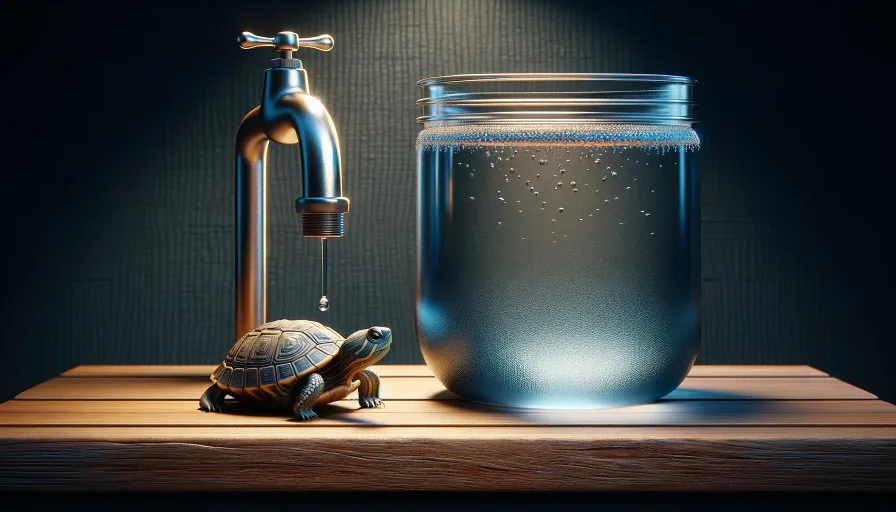
When it comes to providing the best water for your turtles, you may be wondering whether distilled water or tap water is the better option.
Let’s explore the differences between the two and determine which one is more suitable for your turtle’s tank.
Distilled water:
Distilled water is considered the safest choice for turtles, as it is free from harmful chemicals and mineral deposits.
It undergoes a purification process that removes impurities, making it neutral in pH and requiring no additional treatment.
Distilled water provides a clean and pure source of hydration for your turtle.
Treating tap water:
On the other hand, tap water can be used for turtles after proper conditioning. Tap water may contain minerals such as lime and calcium, which can be harmful to turtles if not treated.
To make tap water safe for your turtle, you can use a water quality report to assess its pH, ammonia levels, and general hardness.
Based on the results, you can then treat the tap water to ensure it is suitable for your turtle’s tank.
Choosing between tap water and distilled water:
The choice between tap water and distilled water ultimately depends on individual circumstances and the water quality in your area.
If your tap water is safe for turtles after treatment, it can be a cost-effective option.
However, if you prefer to provide the purest water for your turtle or if your tap water quality is a concern, then distilled water can be a more reliable choice.
Remember to always prioritize your turtle’s health and well-being when making decisions about their habitat and water source.
Providing clean and safe water is essential for maintaining their overall health and happiness.
Water Conditioning for Turtle Tanks
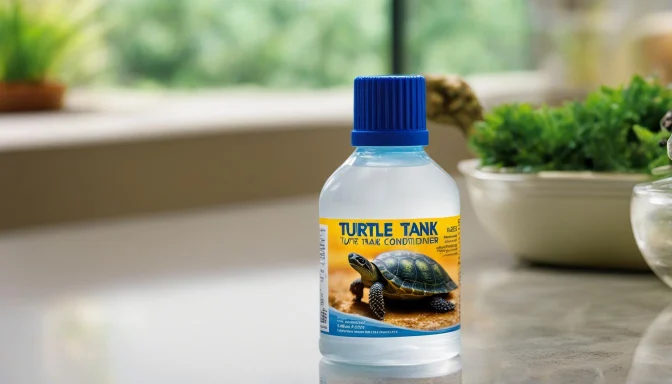
Ensuring the highest water quality in your turtle tank is essential for the health and well-being of your pet.
By adding a water conditioner, you can remove harmful chemicals from tap water and create a safe environment for your turtle.
Water conditioners are specifically designed to eliminate chlorine, chloramines, ammonia, and heavy metals, which can be detrimental to your turtle’s health.
There are several water conditioners available in the market that can effectively treat tap water for turtle tanks.
Brands like APITap Water Conditioner, Chlorine Test Strips, and Seachem Prime are popular choices among turtle enthusiasts.
These products not only remove harmful chemicals but also provide additional benefits such as protecting your turtle’s delicate skin and improving overall water quality.
When using a water conditioner, it is important to follow the recommended dosages and usage instructions provided on the product labels.
This will ensure that the water is properly conditioned without any adverse effects on your turtle. Regularly testing the water for chlorine, chloramines, ammonia, and heavy metal levels is also a good practice to maintain optimal water quality.
In addition to removing harmful chemicals, water conditioners play a crucial role in neutralizing any leftover chemicals from tap water, making it safe for your turtle to thrive in.
Furthermore, these products help to improve the overall water quality by reducing the risk of bacterial and fungal growth, keeping the tank environment clean and healthy.
Remember, maintaining a clean and safe water environment is vital for your turtle’s well-being.
By utilizing a water conditioner and regularly testing the water quality, you can ensure that your turtle has the best possible habitat for a happy and healthy life.
Tips for Keeping Red-Eared Sliders Healthy in Tap Water
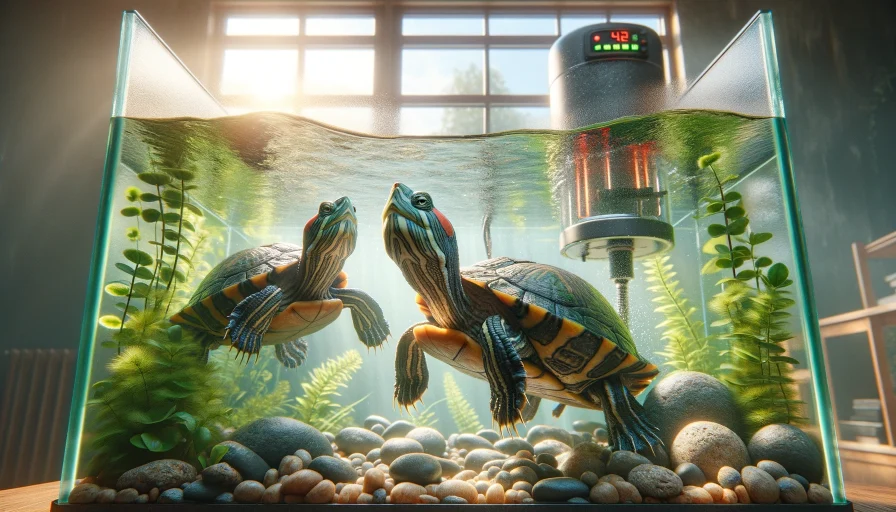
Red-eared sliders are a popular turtle species known for their adaptability to various water conditions.
To ensure the health and well-being of red-eared sliders in tap water, it’s essential to prioritize proper tank maintenance and water quality.
Regular Tank Cleaning
Maintaining a clean environment: Regularly clean your turtle tank to prevent water contamination.
Clean the tank by removing waste and skimming debris from the water surface. This helps maintain optimal water conditions for your red-eared sliders.
Water Temperature Regulation
Maintaining a suitable temperature: Keeping the water temperature between 75-86°F is crucial for red-eared sliders’ health.
Temperature extremes can cause health issues for these turtles. Utilize a reliable water heater to maintain a consistent and suitable temperature for your sliders.
Regularly monitor the water temperature to ensure it remains within the recommended range.
Balanced Diet and Clean Drinking Water
Nourishment and hydration: Providing a balanced diet is essential for the overall well-being of red-eared sliders.
Offer a variety of commercial turtle pellets, leafy greens, and protein-rich foods, such as insects or small fish.
Additionally, ensure your turtles have access to clean drinking water at all times. Clean, fresh water is essential for their hydration needs.
Regular Veterinary Check-Ups
Maintaining health through professional care: Regular check-ups with a reptile veterinarian are crucial for monitoring your red-eared sliders’ health.
A veterinarian can help identify potential health issues early on and provide appropriate treatment or advice.
By prioritizing regular veterinary care, you can ensure the long-term well-being of your turtles.
Conclusion
Turtles can successfully live in tap water with proper care and conditioning. Creating an ideal turtle habitat involves considering factors such as tank size, water depth, and temperature.
Providing a clean and safe environment is crucial for their well-being.
Regular tank maintenance is essential to maintain water quality. This includes performing routine water changes and keeping the filter clean.
It is also important to test the water and use a reliable water conditioner to remove harmful chemicals, ensuring the turtle’s health and preventing potential illness.
By following these care tips, turtles can thrive in tap water and enjoy long, healthy lives as cherished pets.
Remember to always prioritize the well-being of your turtle by providing them with a suitable turtle tank setup and maintaining the quality of their tank water.
Frequently Asked Questions
Q: What type of water do turtles need?
A: Turtles require clean, fresh, and dechlorinated water. The water should be kept at an appropriate temperature and pH level for the species of turtle. Regular water changes and filtration are necessary to maintain water quality.
Q: Is tap water OK for turtles?
A: Tap water can be used for turtles, but it should be dechlorinated first as chlorine and chloramines in tap water can be harmful to turtles. Dechlorinating solutions are available at pet stores.
Q: How do you Dechlorinate tap water for turtles?
A: To dechlorinate tap water for turtles, you can use a dechlorinating solution available at pet stores. Follow the instructions on the product. Alternatively, letting tap water sit for 24-48 hours allows chlorine to dissipate.
Q: Can red eared sliders live in tap water?
A: Red eared sliders can live in tap water as long as it has been properly dechlorinated. It’s important to ensure that the water is free from harmful chemicals and at the right temperature.
Q: Can you use bottled water for turtles?
A: While you can use bottled water for turtles, it is not necessary and can be costly. If you opt for bottled water, ensure it does not contain added minerals or fluoride, which may not be suitable for turtles.



